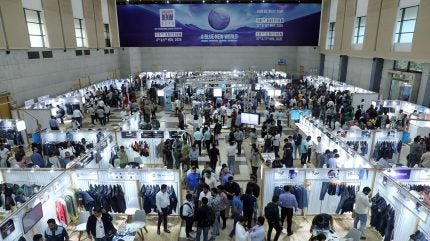
Organised by Bangladesh Apparel Exchange, the two-day expo featured more than 45 exhibitors from seven countries, showcasing a wide range of denim products, fabrics, accessories, chemicals, and technologies.
The 17th edition served as both a platform for innovation and a catalyst for discussions around the future of the apparel industry, inspiring attendees to pursue sustainability and growth.
The theme for this year’s event, “A Blue New World,” emphasised the importance of innovation and sustainability in the fashion industry, with a particular focus on eco-friendly practices and responsible sourcing. The expo highlighted Bangladesh’s commitment to blending ethical responsibility with high-quality production as the country continues to position itself as a key player in the global apparel market.
Bangladesh Foreign Affairs Ministry additional foreign secretary (Multilateral and Regional) M Riaz Hamidullah said: “Many people believe that Bangladesh would be able to meet all of the expectations. But there are a lot of challenges. I think at the end, liberty, inclusion, and transparency will be the key. Labour rights are also a value proposition.”
In addition to the exhibitions, the event offered learning opportunities through two insightful panel discussions with internationally recognised experts.
The first panel, titled What Steps Must Bangladesh Take to Lead the Global Apparel Industry by 2030?, delved into the necessary strategic steps for Bangladesh’s Ready-Made Garment (RMG) sector to evolve from a low-cost production hub to a global leader in high-value, sustainable apparel by 2030.
How well do you really know your competitors?
Access the most comprehensive Company Profiles on the market, powered by GlobalData. Save hours of research. Gain competitive edge.

Thank you!
Your download email will arrive shortly
Not ready to buy yet? Download a free sample
We are confident about the unique quality of our Company Profiles. However, we want you to make the most beneficial decision for your business, so we offer a free sample that you can download by submitting the below form
By GlobalDataThe second panel, Shaping the Future of the RMG Sector: GSP+ and LDC Transition, addressed challenges faced by Bangladesh as it works toward exiting Least Developed Country status by 2029 and securing Generalised Scheme of Preferences Plus (GSP+) eligibility to maintain market access.
The expo attracted more than 5,543 visitors from 56 countries, underscoring the global interest.
Edwin Koekkoek, first counsellor & team leader, Green Inclusive Development, Delegation of the European Union to Bangladesh, said: “In the area of sustainability, due diligence is a key element. In Bangladesh, we can see progress on labour rights and environmental standards. The decarbonisation of Bangladesh will be a priority.”
Supplier acknowledgement and enforcement of labour rights remained a key theme of the event.
Mohammad Sohel Sadat, Chairman, Shin Shin Group, added: “The sustainability of manufacturing is continuously evolving. We have bigger scope in labor condition improvement and bring it to the next level. I think, among all stakeholders, the labor condition is important. We have to build up our image and educate the workforce. We need to educate entrepreneurs and workers on what needs to be done. We are practising social sustainability in Bangladesh, and we have to showcase how and what we are doing. We must work closely with the customer, brands, and stakeholders. All stakeholders—government, labour union, NGO, foreign delegates—must go into detail to bring in the solution. But we need to do it together.”
While Ole Rosenborg Justesen, Sector Counsellor, Embassy of Denmark in Bangladesh, added: “I would focus on three areas in terms of working with Bangladesh. They are labour rights, labour law & inspection, and investments in the supply chain. Labour inspection is absolutely crucial in terms of improving the working conditions of factories. We have to talk about investments in whole infrastructures. Instead of seeing due diligence as a hindrance, i would suggest considering it as a competitiveness.”
And Ziaur Rahman, Regional Country Manager, Production (Bangladesh, Pakistan & Ethiopia), H&M, said: “This industry is a four-decade-old industry. Our supply chain is much behind in terms of labour law. The awareness level is much less than what it’s supposed to be. In terms of due diligence law, many suppliers are not fully aware of it and what areas they need to comply with. I think we have the basic recipe, and we need to start from there.”



